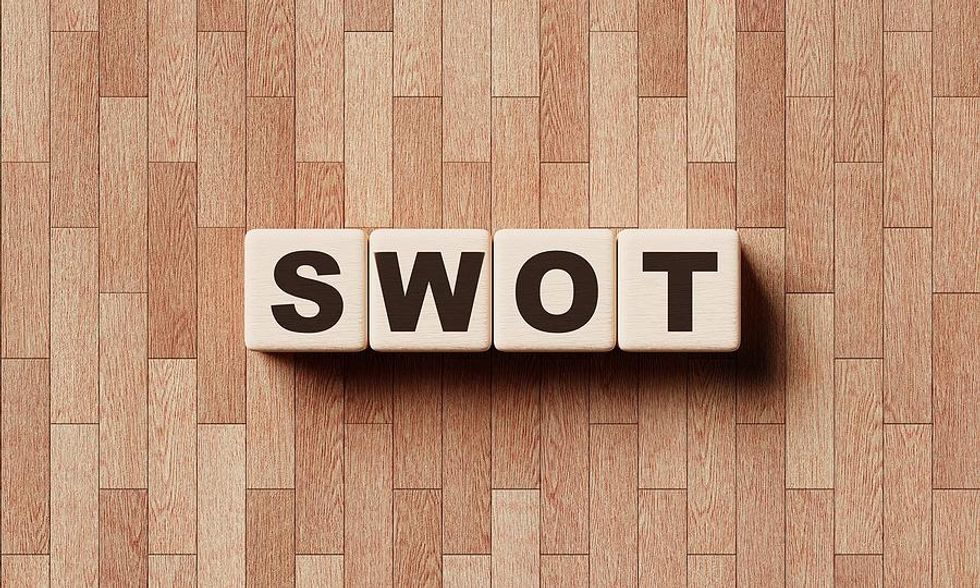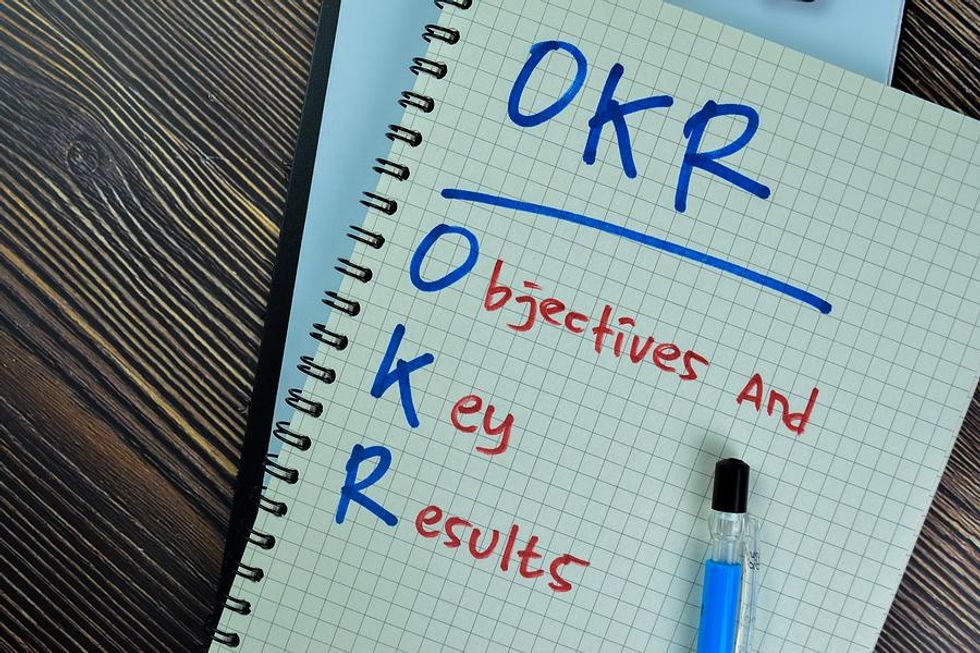To the surprise of many, there are actually a number of executive interview questions that get asked quite frequently. Despite these positions being incredibly important and holding a lot of responsibility, interviewers still have some go-to queries you need to be ready for!

This list will help you prepare ahead of time, so you can improve your chance of getting the job.
1. What’s Your Preferred Method for Tracking Performance Within Your Team?
A big part of being an executive is ensuring your employees perform well and continue contributing to the company’s success. That involves tracking performance metrics and taking steps to address any issues you discover.
This executive interview question gets asked for a couple of reasons. First, it lets you talk about your unique approach and what you do to maintain high productivity. Secondly, it highlights what traits you find most important in your team.
The best way to answer this question is to provide a detailed example of how you’ve tracked employee performance in the past. Research the company and understand its core values. Understanding this determines how the company defines success and what employees need to make it happen.
Structuring your answer so it aligns with both your values and the values of the future employer plus providing real-world examples is a great way to reassure hiring managers that you have what it takes to keep your team motivated and productive.
2. What are the Hardest Parts of Holding an Executive Position?
Being an executive isn’t an easy job. You face many unique challenges and pressure to keep the organization running smoothly.
This executive-level interview question is about explaining how you overcome those hurdles and maintain success. Your response gives interviewers more insight into your core values and helps them understand what your priorities are.
Reflect on your experience as an executive. Discuss the most difficult parts of the job, such as terminating employees or making budget cuts. Talk about why those moments are so challenging, but emphasize how you overcome them and how you''ve learned to confront them confidently.
3. How Do You Maintain a Good Work-Life Balance?
The key to answering this question is to show hiring managers that you know how to find the right balance between your personal life and career. Executive positions can be stressful, and companies wish to hire executives who can remain calm, think reasonably, and maintain good mental health.
Go over the techniques you use to destress and what you do to ensure you can leave work and enjoy your personal life.
4. What Do You Think Our Company is Doing Well? What Do We Need to Improve?
Questions like these help interviewers understand your knowledge of the company. It’s always important to research companies before you get to the interview stage. This is your opportunity to highlight how you look objectively at the big picture, analyze information and present solutions.
Executives are key decision-makers who must have in-depth knowledge of the organization to succeed.
Take time to learn as much about the company as possible. As you research, identify the organization’s strengths and weaknesses so that you can talk about them confidently.
5. What is Your Management Style?
There are many different types of management styles that executives can employ. This interview question arises because it allows hiring managers to learn more about what you bring to the table and how you’ll fit into the organization.
If you’re unfamiliar with established management styles like authoritative or collaborative, read up on them. Use the right language when discussing your management style, and explain why you prefer to operate that way. Provide examples of how your style has helped you succeed in previous positions.
6. How Do You Motivate Your Team?
Team motivation is another important aspect of being a successful executive. Employees rely on top-down communication and motivation. Executives who know how to keep workers engaged are the most successful and can make a real difference in an organization.
Hiring managers want to know what you do to motivate employees because it reflects your skills. It’s a chance to validate your methodologies and give employers a glimpse into how you’ll interact with employees.
Reflect on your past experiences and choose a moment when you implemented an initiative to motivate your team. Tell a story about what you did and the positive results of your actions.
7. What are Your Strengths?
Questions about your strengths can come up during interviews for any position. But it’s important to put great thought into your response for an executive role.
Interviewers are looking for a few things. First, they want to know what you can bring to the organization. They’re looking to learn about your skills and expertise.
Furthermore, they want to know that you’re self-aware. Executives must understand what they do well to apply their skills appropriately and boost the company’s bottom line.
The best responses come with real-world examples as validation. Consider what you do best and find moments in your career where your strengths resulted in big wins for your former employers.
8. What is Your Preferred Company Culture?
It’s not just about boosting revenue. Executives can play a big part in changing or maintaining a work culture.
This interview question for executives arises because employers want to know that you’ll easily fit into the existing work environment. Most employers hesitate to bring in someone who will completely transform things and go against what already works for the organization.
Do your research. Check out the company website and speak informally with current and former employees to learn about the organization’s culture. You can talk about your preferences, but the best answers emphasize flexibility and the willingness to adapt.
9. Why Do You Want This Position?
This question sounds simple but reveals more about you than you may realize.
The purpose of this executive interview question is to understand where you’re coming from and see if your professional goals align with the companies. They want to learn about your motivations while seeing if you’re sincerely interested in this role with this company.
They want an executive who is passionate about their job. When you respond, steer clear of money-based responses and focus on your true passion for leadership.
Focus on what attracted you to this role and why you want to be part of their company.
10. What Do You Plan to Accomplish Here in Your First Year?
Here’s a question that lets you show off your leadership skills!
Give your response the time and research it deserves. A good answer can move you to the front of the pack.
Interviewers ask this question to executive candidates to see how well you know the organization. It also helps them gauge your expectations. Candidates with a thought-out plan of attack are the most compelling because they want to make a difference and help the company succeed from day one.
Go back to the strengths and weaknesses of the organization. Then, research the company and learn more about how it wants to grow moving forward. Using that information, create a point-by-point plan of what you want to accomplish while keeping the company’s existing operations in mind.
11. Tell Me About a Leader You Look Up To
Discussing leaders you admire tells hiring managers a lot about your potential. It unveils what traits you value most as a leader, giving employers a glimpse of the characteristics you may uphold.
Pick a leader that made a big impact on your life and career. Talk about what traits you respect most and how they’ve shaped you as an executive.
12. Can You Walk Me Through Your Typical Decision-Making Process?
Executives are responsible for making decisions that can significantly impact a company’s success. Employers want to know that you treat those moments with the respect they need and that you acknowledge the outcomes of your decisions.
There are many different types of decision-making processes. You can talk about established techniques like command or consensus decision-making. Alternatively, you can walk hiring managers through your thought processes to unveil your unique approach.
The best way to answer is to provide a real example of a big decision you had to make in a previous role. Set the stage, talk about the problem you had to solve, and what you did to arrive at your conclusion. Always be sure to include the impact or results associated with your decision.
13. What Do You Do If One of Your Employees is Struggling?
This interview question for executive candidates goes back to employee motivation and how it can impact a team’s performance. There will be moments when an employee struggles and leaders can approach those situations in many ways. Some will take time to motivate employees and provide the support they need to improve. Others will terminate the struggling employee and hire a new one!
Most hiring managers prefer to hear about the former scenario. They want to know how you address skills gaps and performance issues to improve productivity and success across the board.
Once again, providing an example is the best approach. Discuss a situation where an employee’s performance was causing issues. Talk about what you did and how your actions benefited both that employee and the organization.
14. Can You Share One of the Biggest Challenges You’ve Faced in Your Career?
Hiring managers use this question to learn more about your problem-solving skills. Executive positions come with many hurdles to overcome, and you likely have many stories of tough situations that put your skills to the test.
Choose a moment from your career that challenged you as a leader. Talk about what made it so difficult before detailing your approach to finding a resolution. The most important thing when responding is to focus on the positive outcome.
You can mention how the incident put you out of your comfort zone or forced you to think outside the box, but you should always emphasize what you learned. How did it make you a better leader? How did you apply your skills to find the right solution?
15. How Do You Handle Stress?
Stress is a normal part of the job as an executive. However, successful leaders know how to manage it.
That’s what hiring managers are looking to learn. They want to know you have techniques to manage stress, stay level-headed, and succeed.
Your response should cover what you do to manage the stress of the job, such as meditation, time management, etc. Avoid anything controversial or methods that paint a negative light on your character.
16. What Do You Like Most About Working in a Leadership Position?
Here’s another executive interview question that helps employers learn more about you, your passions, and your motivations. There’s a lot to love about being a leader. Despite all the challenges, it’s a chance to make a difference.
Your response should cover the most enjoyable aspects of having an executive role. For example, you could mention that you enjoy playing a critical role in the company’s success or bringing out the best in employees.
Keep things positive and professional while exploring what you can do for the organization.
17. What are Your Weaknesses?
Like the question about your strengths, inquiries about your weaknesses aim to test your self-awareness.
While many people hesitate to talk about potential pitfalls in an interview, the right response can help you stand out among candidates. When talking about things you need to work on as a leader, focus on your commitment to growth and professional development.
No one is perfect, and no employer expects you to be. However, they love to hear candidates be honest with themselves and take steps to make improvements. Talk about what you do to address your shortcomings and your quest to become the best leader possible.
18. If We Hire You, What Will You Want to Focus on First?
Hiring managers want to know that you have a plan of attack that starts on day one! Of course, they don’t expect you to make sweeping changes immediately, but they want to see that you''ve put some thought into what you''d like to accomplish.
Consider discussing your plans to adapt and learn. There’s always an adjustment period for new hires, and executives are no different. You can mention how you plan to familiarize yourself with company operations, meet with team leads, and figure out how you can apply your skills to positively influence the organization.
19. Are You Satisfied With How Your Career Has Gone So Far?
Here’s a tricky executive interview question that catches many candidates off guard. Above all else, it''s a question that requires self-reflection.
Interviewers ask it to gauge your confidence and learn more about your career goals. They want to hear what you think of your career so far and what you want to do moving forward.
Always focus on the positive. Go over a few success stories and discuss how you want to continue pushing yourself.
20. How Do You Handle Conflict Within Your Team?
Conflicts will happen at work, and it’s often your job as an executive to address them and maintain productivity. This question helps employers learn more about your conflict resolution skills and the techniques you use to squash drama.
Provide an example of conflicts within previous teams. What did you do to find a solution that benefited everyone? Like all questions that gauge your leadership skills, emphasize the positive outcome to validate your methods.
21. How Do You Ensure That Multiple Departments Communicate With Each Other Effectively?
Good communication can dramatically improve company productivity, but many organizations struggle with cross-departmental collaboration. This interview question for executives aims to find out how you would handle communication barriers. It’s a test of your problem-solving skills while allowing you to show how much you value efficient communication across teams.
Use an example from your past where you resolved a communication issue. This question is about showing how you would boost productivity and improve operational efficiency by getting teams to communicate better with each other.
You can talk about asking for feedback to better understand the needs of every department, working with IT to develop a dedicated communication channel, or empowering the teams to develop a solution.
Conclusion
Now that you''re familiar with the most common interview questions for executive candidates, it''s time to do some preparation. Executive positions are highly competitive, so you never want to pass up an opportunity to get a leg up on the competition.
The post 21 Common Executive Interview Questions (Plus Answers) appeared first on Career Sherpa.











